These two signs could so easily be overlooked by people thinking they were benign skin problems that would go away over time
A dermatologist has urged people not to ignore subtle signs to look out for that could indicate they have skin cancer.
Dr Fatima Awdeh, of Riverside Skin and Laser Clinic in Essex, England, has revealed two little-known signs of skin cancer that most people miss.
One in five Americans will develop skin cancer before the age of 70, with 9,500 people in the US receiving the diagnosis each day, and more than two people in the country succumbing to this specific type of the disease each hour, according to the Skin Cancer Foundation.
It also notes how more people are diagnosed with skin cancer every year in the States than all of the cancers combined, and it costs the US around $8.1 billion to treat.
Taking to the clinic’s Instagram page, Awdeh posted: “Signs of skin cancer can include new growths or changes in existing ones, such as moles or patches of skin, that are new, changing, or growing.
8.4K
Fox News co-host told he has skin cancer on air
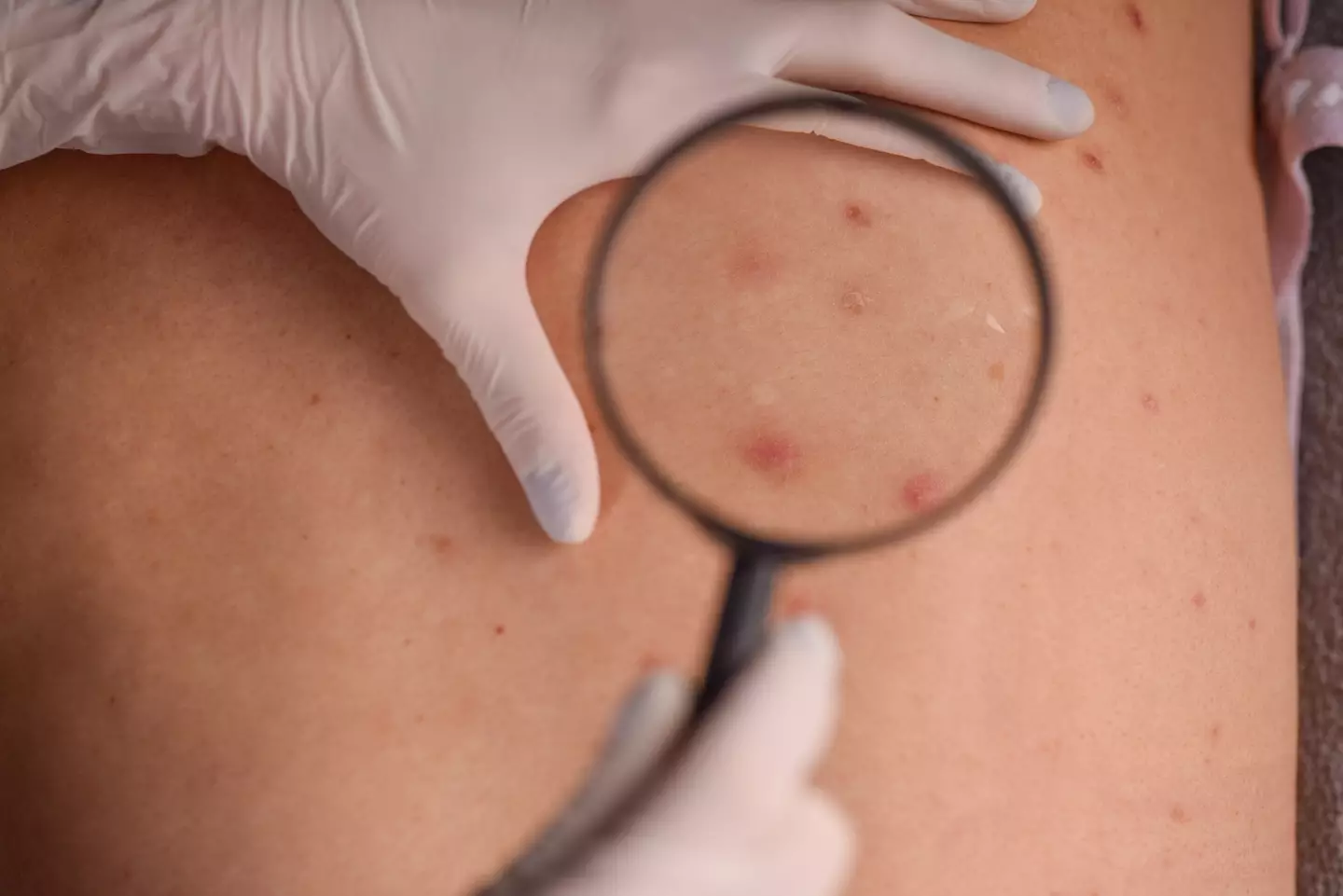
Dr Fatima Awdeh explained how there are two little-known signs someone could have skin cancer (Getty stock)
“These changes may include changes in size, shape, color, or border.
“Other signs include sores that don’t heal, or heal and then come back, as well as itching or pain in an area of skin.”
The consultant dermatologist identified three symptoms of skin cancer, and while one of them is fairly obvious that something is wrong, the final two are much harder to self-diagnose.
The first of two little-known signs of cancer is a non-healing patch of eczema, which is a sign of squamous cell carcinoma (SCCs).
According to the American Cancer Society, about two in 10 skin cancers are SCCs and they appear on sun-exposed areas of the body.
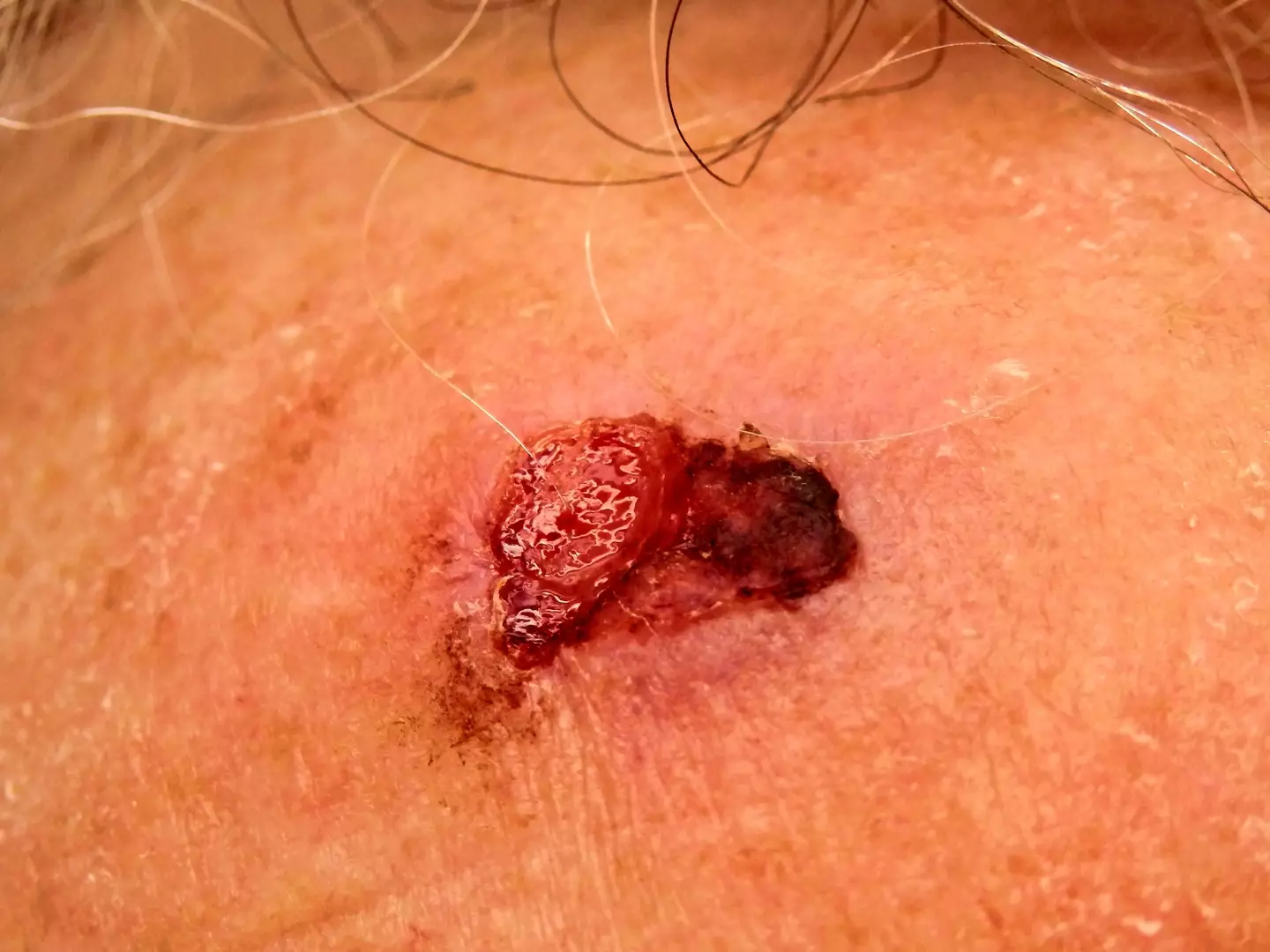
Squamous Cell Carcinoma on a forehead from over exposure to UVA particularly sunlight, resulting in the need for an operation to remove it (Getty stock)
With the other little-known sign being a non-healing pimple, otherwise known as basal cell carcinoma (BCCs) – which is the most common type of skin cancer.
Meanwhile, the third more obvious issue was if a new streak pops up under your finger or toe nail – which indicates melanoma.
Melanoma is a skin cancer, which according to the Mayo Clinic, ‘starts in the melanocytes’.
The website states: “Melanocytes are cells that make the pigment that gives skin its color. The pigment is called melanin.
“Melanoma typically starts on skin that’s often exposed to the sun. This includes the skin on the arms, back, face and legs. Melanoma also can form in the eyes. Rarely, it can happen inside the body, such as in the nose or throat.”
If you’ve been affected by any of these issues and want to speak to someone in confidence, contact the American Cancer Society on 1-800-227-2345 or via their live chat feature, available 24/7 every day of the year.Featured Image Credit: Getty Stock Images
Topics: Cancer, Health, US News
.jpg)
Published 14:37 1 Jun 2025 GMT+1
Doctor warns people never to ignore common cancer symptom that’s often dismissed during hot weather
If you’re having this symptom regularly, it’s best to visit your GP
A health expert has issued a warning regarding a common cancer symptom many people often ignore during the hot weather.
With the official start of the summer season coming later this month, temperatures across the US are set to sharply increase.
And while it’s all well and good enjoying the sunshine during the daytime, sleeping at night can be a bit of a nightmare due to humid conditions.
Night sweats can become a common occurrence due to the hot weather, but one doctor has warned frequent night sweats could be a sign of a serious underlying condition.
Dr Suhail Hussain has said they may be a sign of leukaemia or lymphoma, two cancers that affect blood cells.

A doctor has issued a warning (Getty Stock Photo)
While leukaemia is primarily a cancer of the bone marrow, lymphoma affects the lymphatic system.
Dr Hussain told the Express: “Night sweats are a common phenomenon and one that’s far more likely to occur on hot, sticky nights.
“But persistent or unexplained sweating during sleep shouldn’t be ignored—particularly if it happens alongside other symptoms like weight loss or fatigue.
“The occurrence of such symptoms should not merely be dismissed as ‘oh well it’s just hot outside’.”
The GP added: “Night sweats can be a sign of something more serious, such as a serious infection, the menopause—or even cancer.
“Sweats associated with cancer are normally drenching—literally. You can wake up with your pyjamas and bed sheets wringing wet with sweat.”
If you’re suffering from extreme night sweats regularly, then you should be paying your GP a visit, Dr Hussain explained.

Night sweats could be a sign of something more sinister (Getty Stock Photo)
The health expert added: “Other rare cancers can also cause sweating. A group of cancers known as carcinoids affect hormonal function vie the neuroendocrine system, and hence may result in excess sweating.
“The bottom line is that if you feel like sweaty Betty or perspiring Pete and it’s going on a bit too long, then head over to your GP and get it checked out.”
Leukaemia Care has a ton of handy bits of information on its website regarding night sweats and how it could be a sign of cancer.
They explained that it’s important to book a doctor’s appointment if ‘you regularly have night sweats that wake you up at night’. On top of that, you want to pay a health care professional a visit if you ‘wake up drenched in sweat, unable to cool down, even if your room is cool’.Featured Image Credit: Getty Stock Images
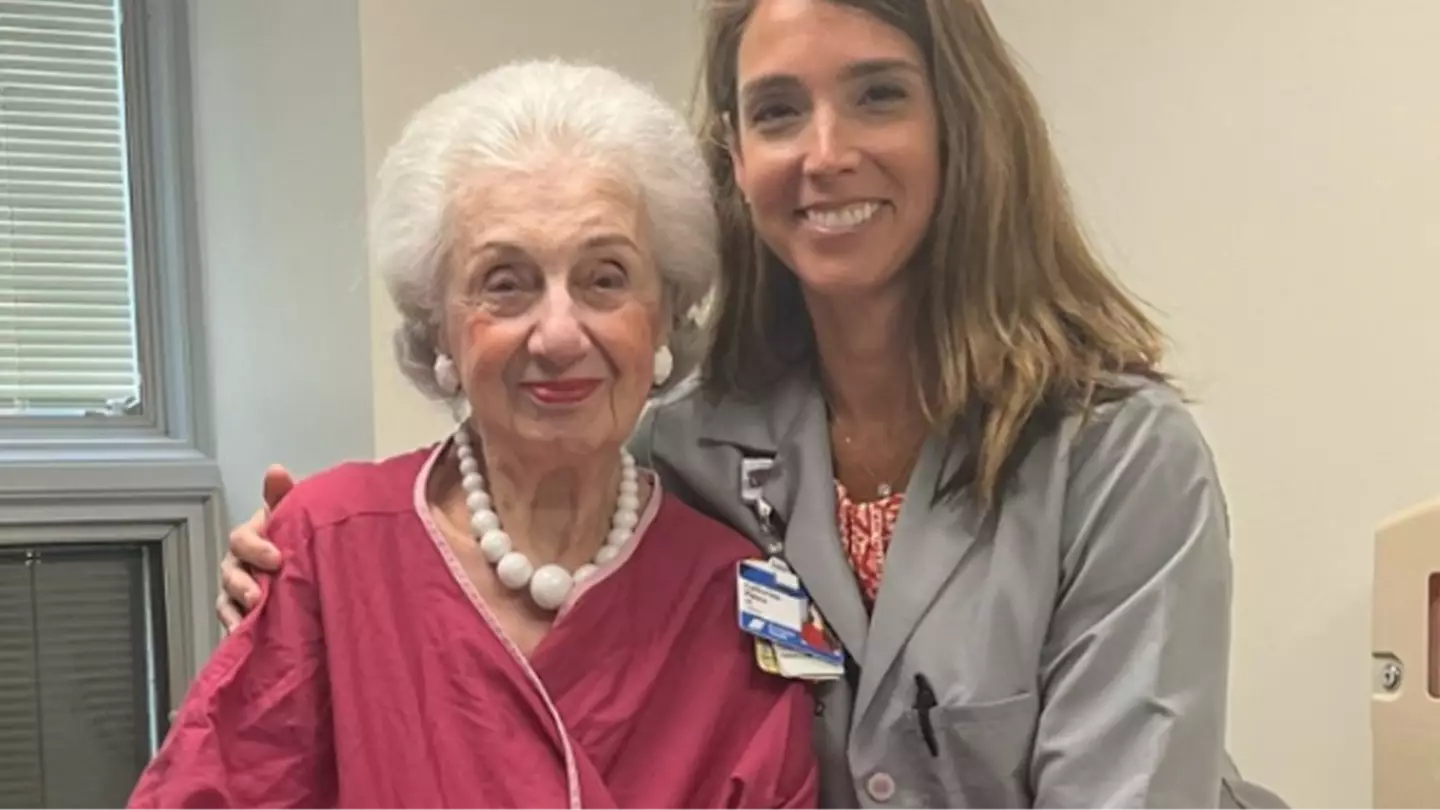
Published 17:35 4 Jun 2025 GMT+1
Woman diagnosed with cancer at age 100 is now cancer free at 101 as she reveals secret to long life
Layne Horwich has beaten cancer, crediting her age as why she was able to tackle it easier than someone younger than her
A cancer survivor has spoken out about her experiences having developed the disease at the age of 100, before beating it at 101.
Layne Horwich received her devastating diagnosis breast cancer just two months on from her 100th birthday, and a day after Independence Day last year.
The senior TikTok star explained: “For me at my age, my breast cancer diagnosis was something that I could deal with.”
The Illinois native’s story has been shared by medical group Endeavor Health, having visited its Highland Park Hospital – which is located in a suburb north of Chicago – with the post having gone viral on Instagram.
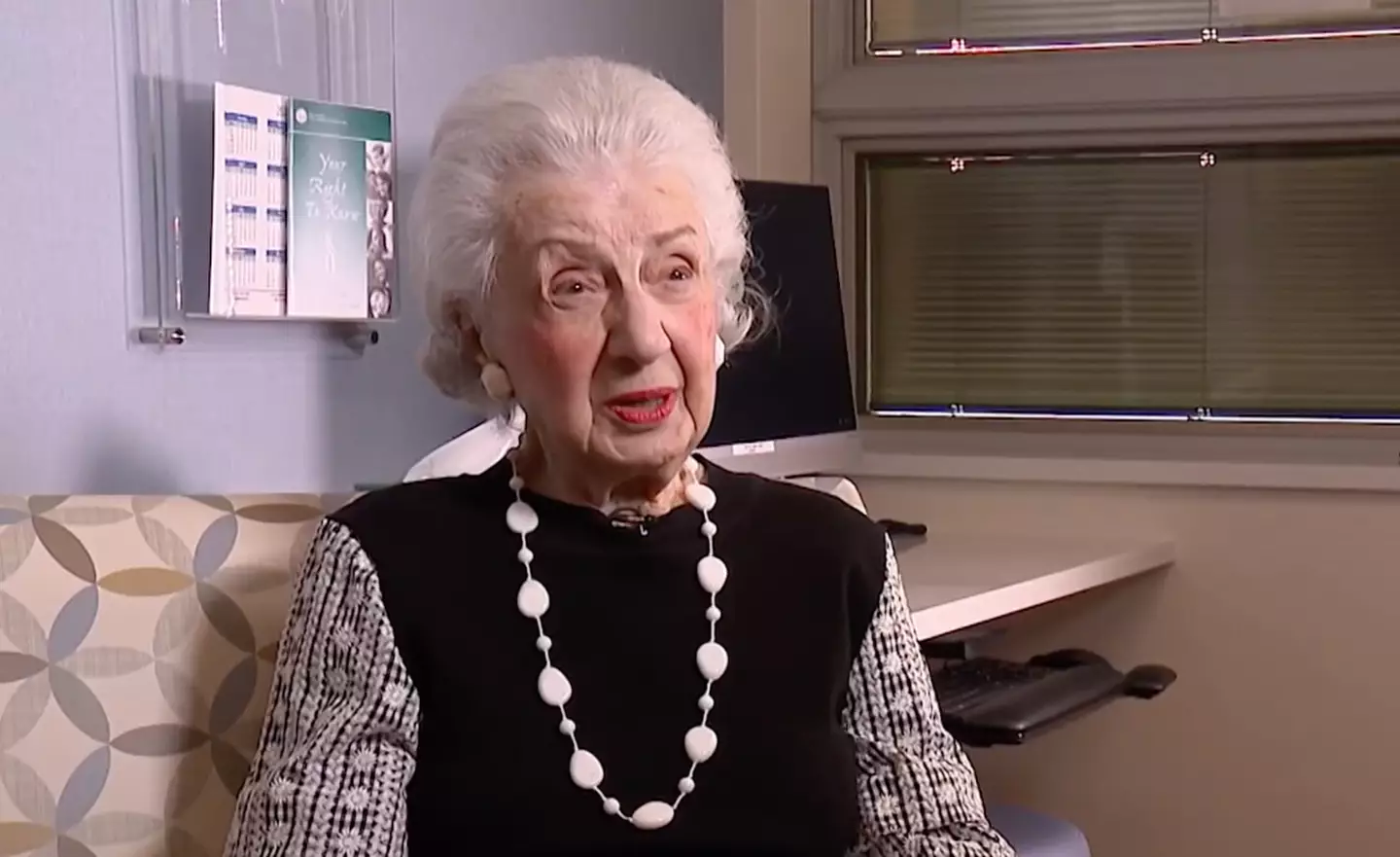
Layne Horwich has beaten cancer after being diagnosed with the disease when she was 100 years old (NBC Chicago)
Taking to the platform, Endeavor Health posted: “When 100-year old Layne Horwich was diagnosed with breast cancer, she elected to have a right breast lumpectomy as it was the most life-friendly solution for her comfort and wellbeing.
“Guided by a team of experts from Endeavor Health, including Catherine Pesce, MD, a surgical oncologist, Layne is back to living as independently as she can and putting peace, calm, kindness and a little fashionable beauty out in the world.”
However, Horwich notes that her circumstances are stark to that of a younger woman who would be more reluctant to undergoing a lumpectomy.
For those unfamiliar with the terminology, a lumpectomy is an operation to surgically remove a portion of tissue from an infected area where a tumor has grown.
“I opted to have surgery because I felt it was a prudent decision for my health,” Horwich continued.
“I know this is not the same for a 30-year-old woman and that breast cancer can alter the rest of her life with complications or reoccurrences and related uncertainty.
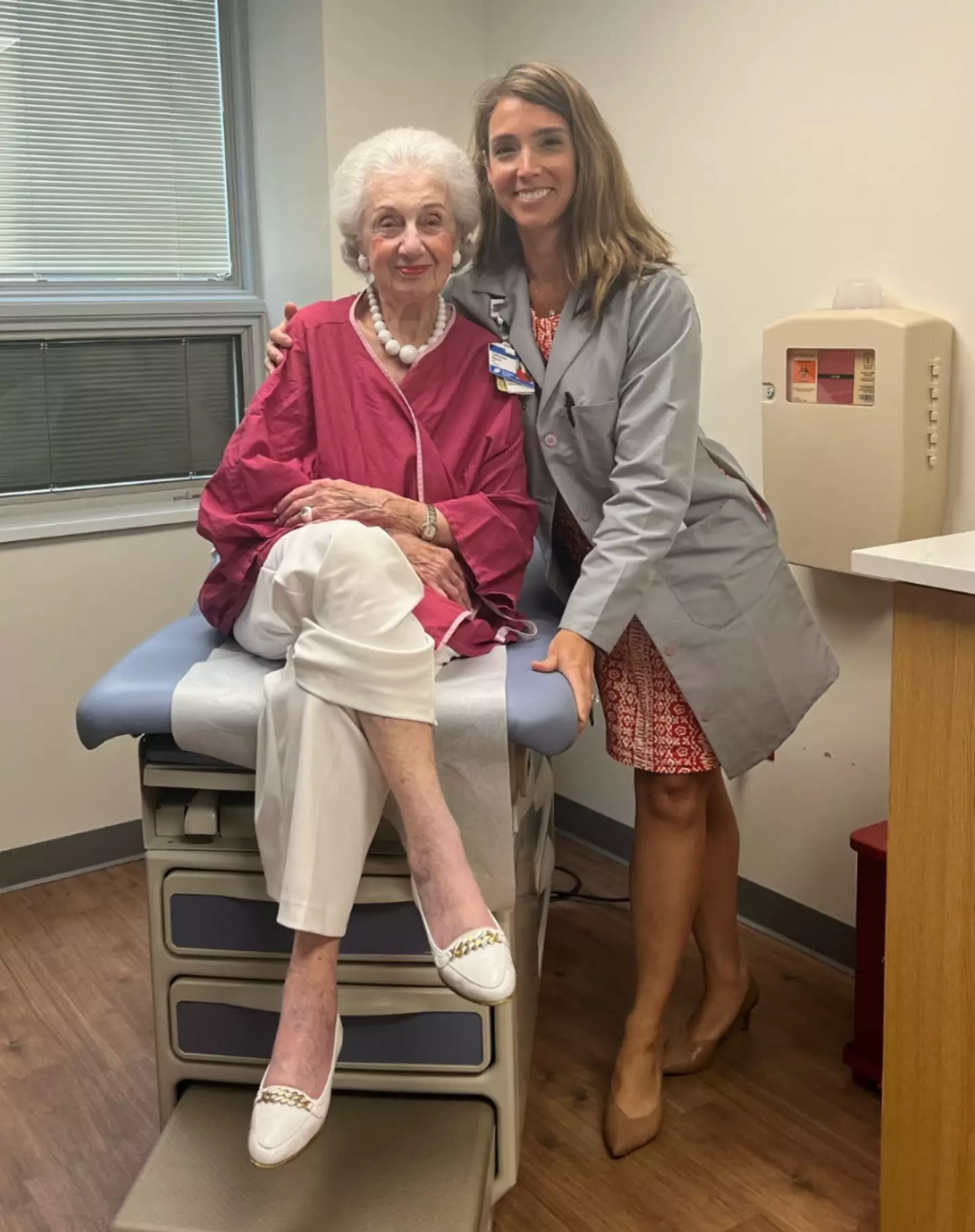
(endeavorhlth/Instagram)
“But at almost 101, a heart attack or a stroke would have been more devastating and could possibly leave me incapacitated.”
Her doctors laid out three plans to her – ‘do nothing, begin an oral medication or have surgery’, explains Dr Catherine Pesce.
She added: “Surprisingly, Layne wanted to have the surgery, but I agreed because I knew she would tolerate it. She is truly an amazing person and is doing great after surgery.
“At her six-month follow-up appointment, everyone in the office was absolutely wowed by her.”
As for her secret for a long-life, Horwich credited it to keeping active.
She added: “I do everything I can to keep going, like reading and playing cards.
“I played tennis regularly until I was 92. I try to do all the right things to stay active and healthy.
“In this case, I was fortunate to find Dr. Pesce. I encourage other women to stop living with something that bothers them or could be a medical concern. Seek expert care.”Featured Image Credit: Instagram/endeavorhlth
Topics: Cancer, Breast cancer, US News
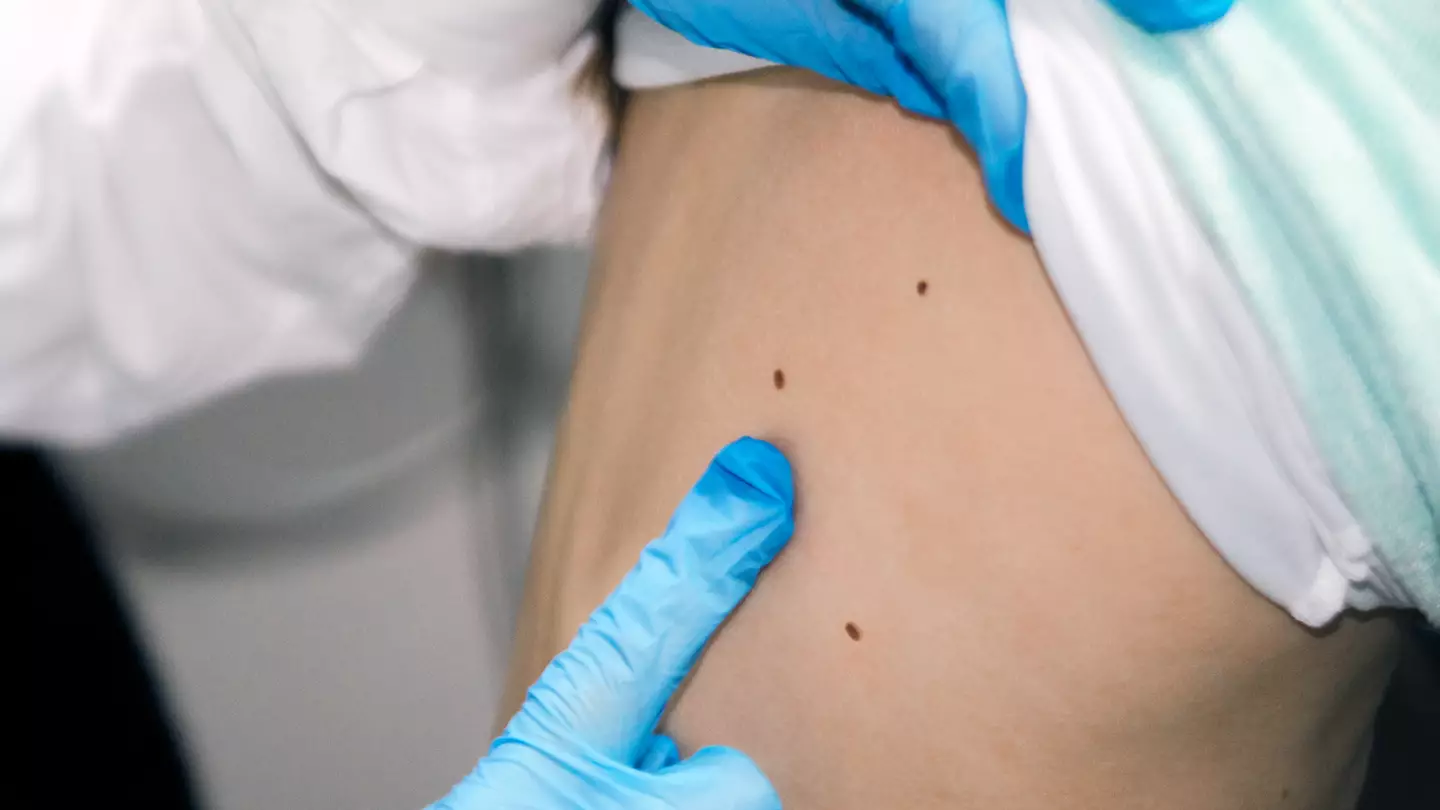
Published 15:08 13 Feb 2025 GMT
Experts reveal subtle signs of marks on your skin that could mean you have deadly cancer
A specific condition is more than 60 percent likely to spread to your brain if not caught early
Experts have revealed the signs of skin marks on your skin that could be an underlying deadly condition.
After Teddi Mellencamp, the Real Housewives of Beverly Hills star was diagnosed with ‘multiple’ brain tumors, it brought attention to a specific condition which can cause horrible consequences if left unchecked.
Mellencamp revealed that she has several malignant masses in her brain after experiencing weeks of ‘debilitating’ headaches, with doctors believing that they have been growing for the last six months.
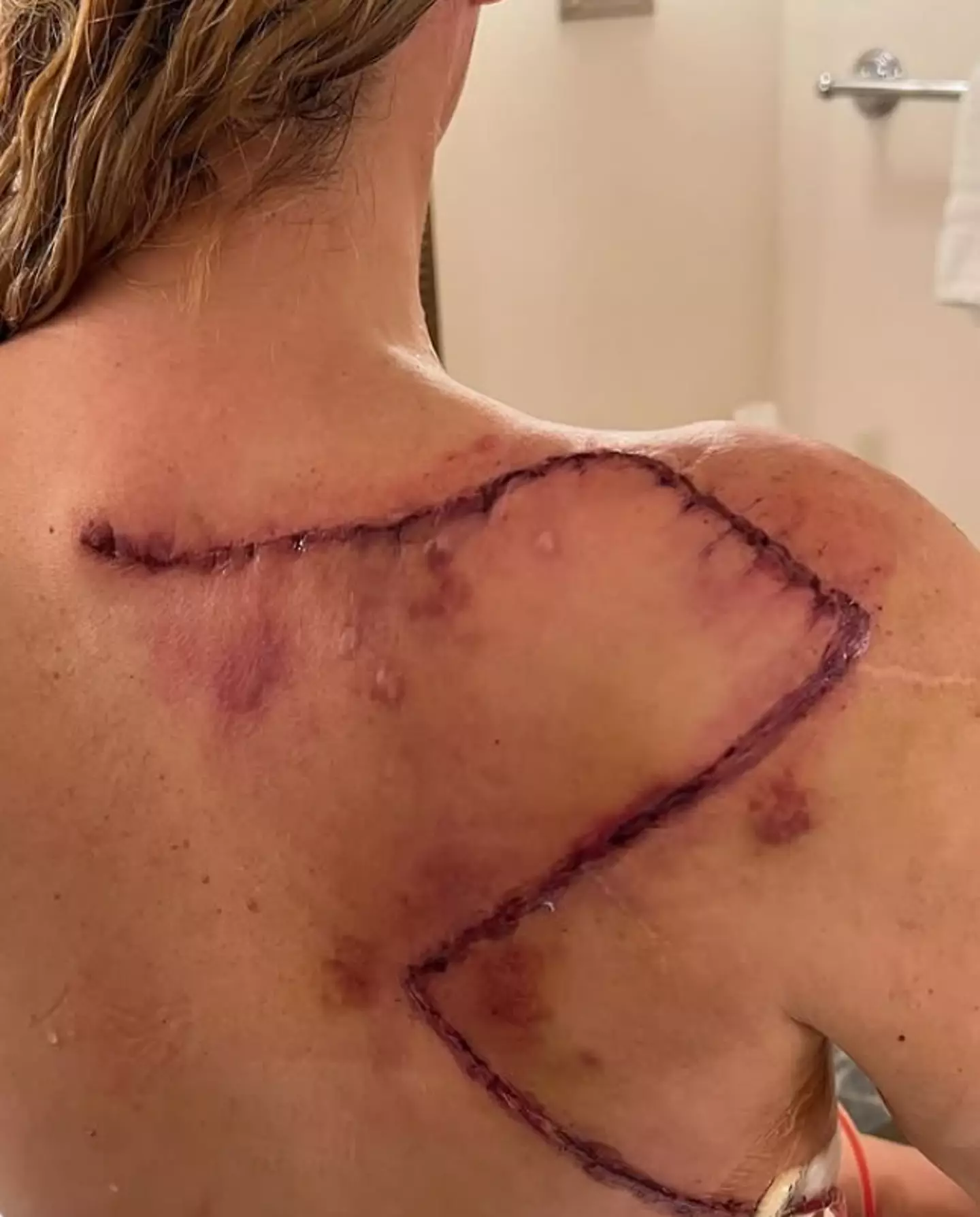
Teddi Mellencamp underwent numerous surgeries for a terrible disease (Instagram/@teddimellencamp)
With scars all over her body from 16 previous surgeries, the 43-year-old is believed to have had a different type of cancer spread to her brain and create the tumors.
It was in 2022 that she was diagnosed with stage two melanoma, that can be found in 100,000 people across the US each year.
Melanoma is a skin cancer, which according to the Mayo Clinic, ‘starts in the melanocytes’.
The website states: “Melanocytes are cells that make the pigment that gives skin its color. The pigment is called melanin.
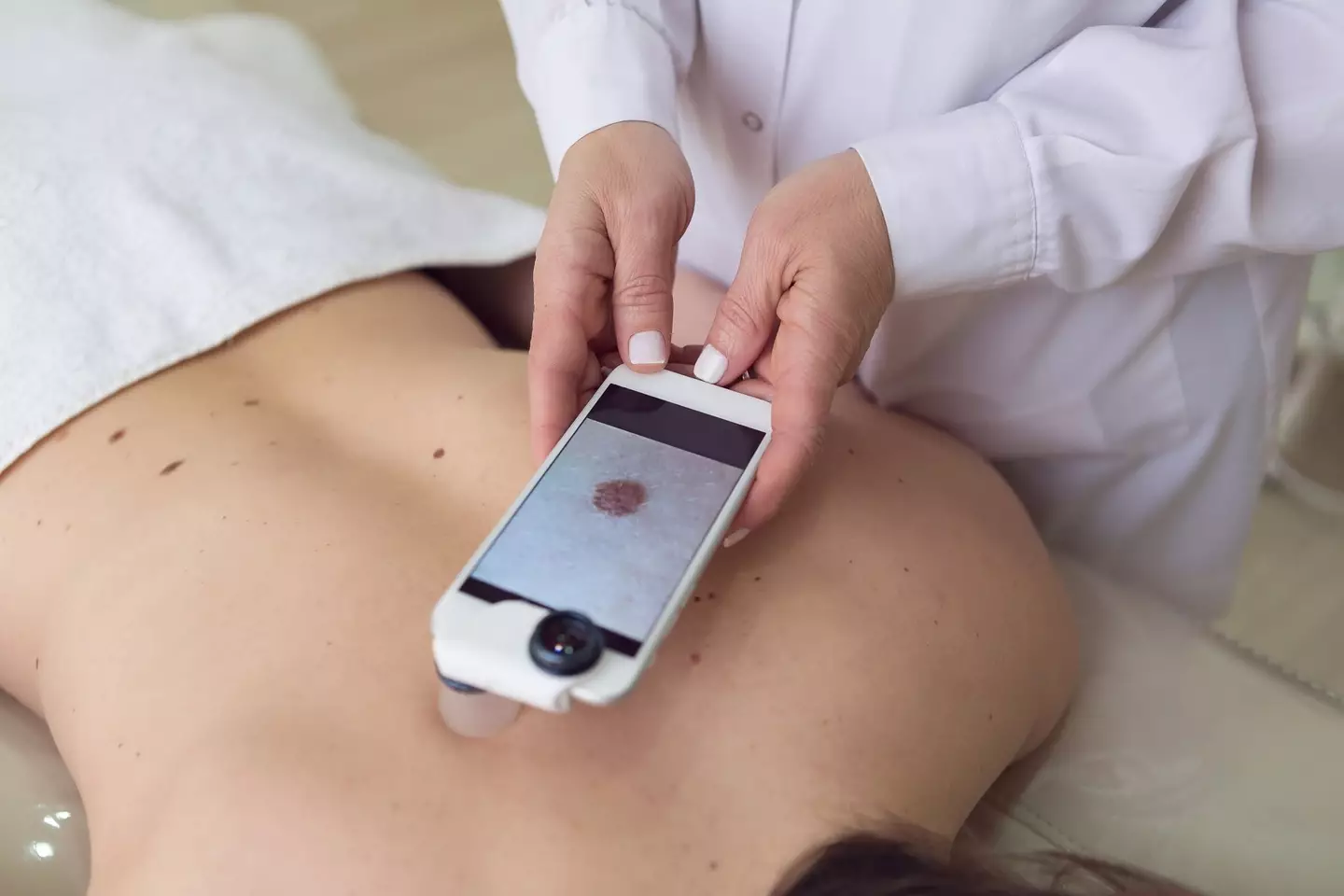
Melanoma can rapidly spread (Getty Stock Image)
“Melanoma typically starts on skin that’s often exposed to the sun. This includes the skin on the arms, back, face and legs. Melanoma also can form in the eyes. Rarely, it can happen inside the body, such as in the nose or throat.”
According to AIM at Melanoma, ‘more than 60% of all Stage IV melanoma patients will develop brain metastases at some point’, which is a scary statistic.
Experts have warned that there are specific ways your skin can look that might actually signal that you have melanoma without realizing it.
Firstly, melanoma blemishes are typically irregularly shaped and brown or black colored with uneven patches.
According to Moffitt Cancer Center, melanoma moles are a different shape, size or color than harmless moles and require checking.
They tend to be unevenly colored and with tan, brown, or black shades that change over time.
Sadly, melanoma is on the rise in the US and kills up to 8,000 people every year.
This disease is deadly as it rapidly spreads throughout the body without detection.
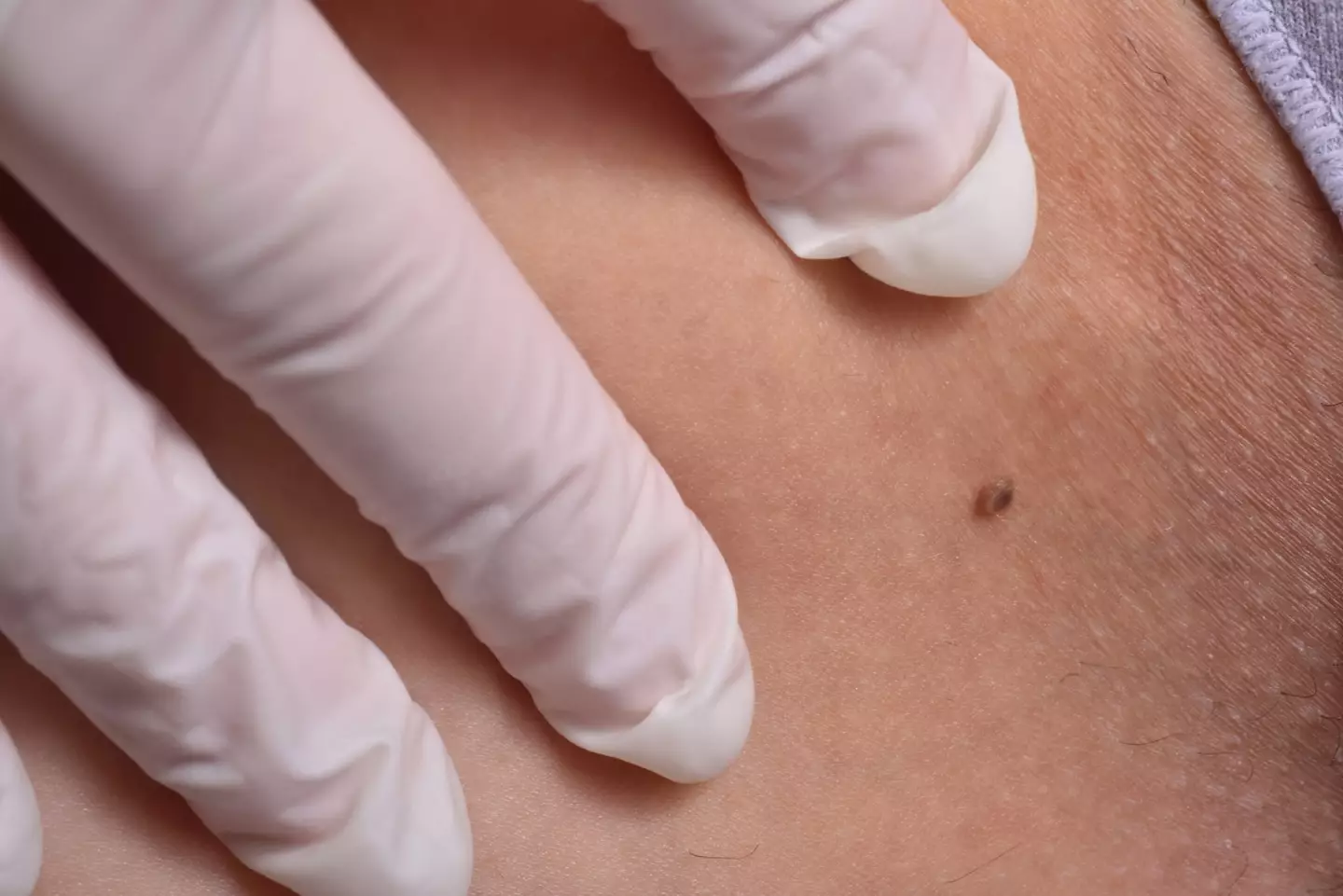
Irregular shaped and uneven toned moles and marks should be checked (Getty Stock Image)
Symptoms of melanoma which has metastasized to the brain can include things such as headaches, seizures, vision problems, paralysis on one side of the body, nausea, vomiting, swollen lymph nodes, weakness, and fatigue, as per the Moffitt Cancer Center.
Shockingly, if you develop skin cancer, you may also be at an increased risk of developing other cancers that are not related to melanoma.
For example, people with melanoma might be more susceptible to developing cancer in the breast, kidney and thyroid, and others.
Treatment for melanoma which has spread to the brain can include chemotherapy, radiation, surgery and targeted therapy.
As per AIM to Melanoma: “Surgery is a standard treatment for melanoma brain metastases. It is potentially curative for patients whose melanoma is otherwise controlled and who have a limited number of brain metastases.”
However, ‘surgery is reserved for patients with fewer than three metastases’ and ‘patients with many tumors, or tumors in critical areas of the brain, are usually not candidates for surgery’.Featured Image Credit: Getty Stock Images

Published 11:19 30 May 2025 GMT+1
New study warns doing these two common things together at parties may raise your risk of colon cancer
You may want to think twice before practicing these two things at the next house party
A new study has found a classic party combo could well raise your risk of developing colon cancer.
While many still assume cancer only impacts the older generation, there’s no doubt the disease is also providing deadly consequences for the younger individuals.
Cancer has been on the rise in younger people for the past few years, and much research is going into uncovering why this worrying trend is happening.
Colorectal cancer is the second leading cause of cancer-related deaths in America, with 153,020 being diagnosed with the disease in 2023 and over 52,000 people losing their lives, according to experts.
Well, new research has found that both alcohol and cigarettes, a common pairing at parties, may increase your risk of developing colon cancer.

The study has provided some interesting results (Getty Stock Photo)
Researchers from Germany found 100 cigarettes in a person’s lifetime can increase the risk of developing colon cancer by 59 per cent compared to those who don’t smoke.
On top of that, the researchers found drinking alcohol every single day, even if it’s just one or two drinks, raises your risk of developing early-onset colon cancer by 39 per cent compared to those who don’t drink.
“Alcohol consumption and smoking are significant risk factors for EOCRC and should be addressed in the context of prevention,” the researchers wrote.
“These results clearly suggest that alcohol consumption is associated with a significantly increased risk of CRC at any age.
“The results on smoking showed a significant association of smoking with EOCRC, while former smoking was not associated with EOCRC.”
Bowel Cancer UK have provided advice when it comes to alcohol and smoking and how you can reduce your risk.

Alcohol and smoking can increase your risk of developing colon cancer (Getty Stock Photo)
They state: “Alcohol is linked to an increased risk of developing several types of cancer, including bowel cancer. Alcohol can damage the cells that line the inside of the bowel, which makes it more likely for cancer to develop.
“To reduce the risk of cancer, it’s best to not drink alcohol.
“If you do drink alcohol, cutting down the amount you drink will reduce your risk. It’s recommended that people drink no more than 14 units of alcohol a week and spread it out over the week. Aim to have at least two days without alcohol each week.”
Meanwhile, they also touched on how smoking cigarettes can increase your risk of developing colon cancer, as they said: “Smoking increases your risk of developing several cancers, including bowel cancer. People who smoke are more likely to develop polyps (non-cancerous growths) in the bowel which could turn into cancer if they’re not treated.”Featured Image Credit: Getty Images/Flashpop
Topics: Health, Cancer, Colon cancer, Alcohol



